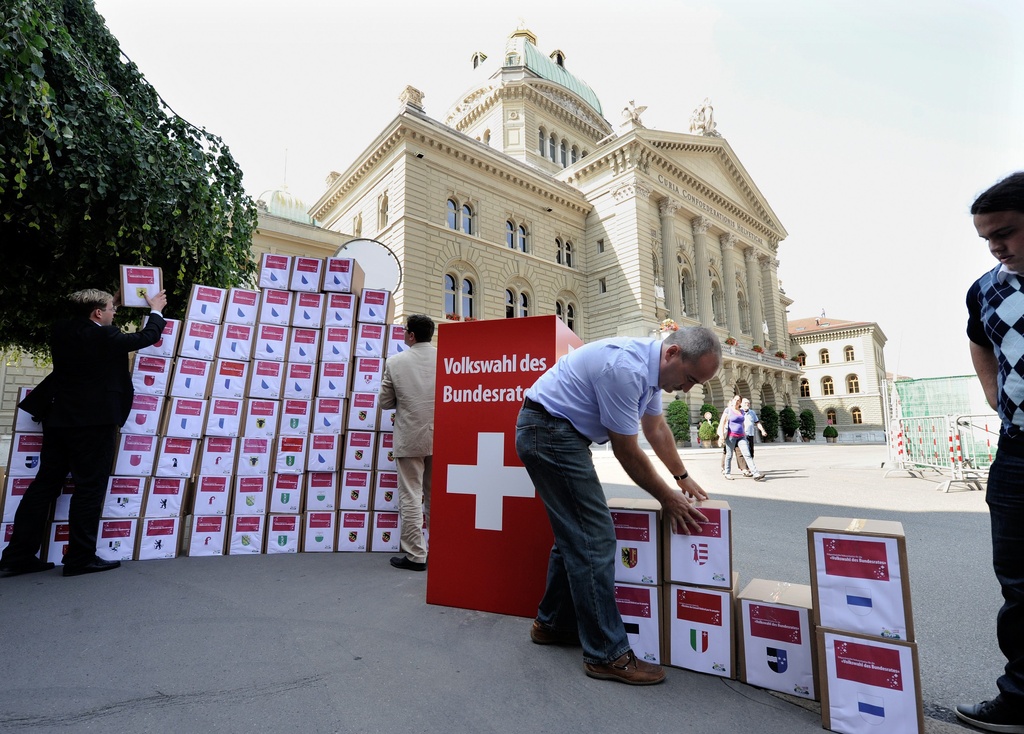People’s choice not on the cards in June vote

A proposal to introduce a nationwide election of cabinet members looks set to be rejected by voters in June according to the latest poll commissioned by the Swiss Broadcasting Corporation. The fate of revised asylum legislation is still not clear.
If the ballot for the cabinet election had been held in late April, only a quarter of voters would have approved the initiative. Perhaps more surprisingly, just 26 per cent of supporters of the rightwing Swiss People’s Party, the main backer of the proposed change, are definitely in favour.
Voters from other parties have also clearly rejected the proposal. According to Claude Longchamp, head of the gfs.bern polling team that carried out the survey, the initiative “doesn’t just have a lot of opponents, but the opposition is widespread as well.”
He adds that a “no” vote is not set in stone at this point. The survey does suggest though that the proposal will be rejected by a strong majority. While most voters agree that local authorities and cantonal ministers should be elected by the people, they are happy with the current system that sees the cabinet elected by parliament.
Supporters say the reform would boost Switzerland’s system of direct democracy. But most voters, like the proposal’s opponents, fear permanent campaigning will become the norm at the expense of ministerial tasks and duties.
Longchamp says the People’s Party cannot count on the population distrusting the government or its election mode. He adds that the subject is so divisive that there will never be a majority to accept the proposal.

More
Results of the first SBC survey
Asylum legislation up in the air
The other issue on the June 9 ballot is the reform of Switzerland’s asylum legislation, which went into effect last September. Opponents gathered enough signatures to force a vote after parliament signed off on it last year.
Changes included suspending the possibility to hand in asylum requests at Swiss embassies as well as rejecting applications from conscientious objectors and deserters. A legal basis was also created to allow asylum seekers labelled as troublemakers to be housed in separate centres.
The survey points to the revised legislation being accepted by voters. At the end of April, 45 per cent of those polled said they were in favour of it, while 29 per cent said they were against. However, nearly a quarter of those who took part in the survey said they still had not made up their minds.
“The legislation has a chance of being accepted. We expect a vote in favour rather than against,” said Longchamp, adding that the vote campaign, which has yet to begin in earnest, would certainly determine the outcome.
Voters on the left and the right are more likely to vote on the legislation, while those closer to the political centre will be less present at the ballot box, according to the survey.
People’s opinions have not yet been formed at this early stage, according to Longchamp. He reckons, however, that voters will cast their ballots based on how they feel about asylum seekers and related issues rather than the revised legislation. In other words, if a voter considers asylum to be a problem, he or she will cast a ballot supporting the changes to the law.
According to the poll, those in favour of the legislation say the authorities need tighter rules to deal with too many asylum requests. Those against say that allowing asylum requests to be made at embassies, which has been banned since September, helps fight human trafficking.
Supporters of the parties on the left of the political spectrum are against the tightening of asylum rules, the centre-right Christian Democrats are split, while People’s Party voters, supporters of the centre-right Radicals and self-declared independents are in favour.
The initiative – the third such attempt in the history of modern-day Switzerland – is indeed aimed at overturning an element of the traditional system dating back to 1848.
The latest proposal was launched by members of the Swiss People’s Party, while the previous attempt in 1942 came from the opposite side of the political spectrum – the Social Democratic Party.
The People’s Party currently has one representative in the seven-member executive council, following the non-election of justice minister and People’s Party strongman Christoph Blocher by parliament in 2007 and the subsequent power struggle within the party.
The initiative’s backers gathered the required 100,000 signatures in 2011. The proposal has been rejected by parliament, but voters will have the final say on June 9.
(Adapted from German by Scott Capper)

In compliance with the JTI standards
More: SWI swissinfo.ch certified by the Journalism Trust Initiative
You can find an overview of ongoing debates with our journalists here. Please join us!
If you want to start a conversation about a topic raised in this article or want to report factual errors, email us at english@swissinfo.ch.